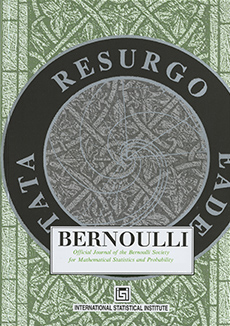Abstract
This paper answers a question of Émery [In Séminaire de Probabilités XLII (2009) 383–396 Springer] by constructing an explicit coupling of two copies of the Beneš et al. [In Applied Stochastic Analysis (1991) 121–156 Gordon & Breach] diffusion (BKR diffusion), neither of which starts at the origin, and whose natural filtrations agree. The paper commences by surveying probabilistic coupling, introducing the formal definition of an immersed coupling (the natural filtration of each component is immersed in a common underlying filtration; such couplings have been described as co-adapted or Markovian in older terminologies) and of an equi-filtration coupling (the natural filtration of each component is immersed in the filtration of the other; consequently the underlying filtration is simultaneously the natural filtration for each of the two coupled processes). This survey is followed by a detailed case-study of the simpler but potentially thematic problem of coupling Brownian motion together with its local time at $0$. This problem possesses its own intrinsic interest as well as being closely related to the BKR coupling construction. Attention focusses on a simple immersed (co-adapted) coupling, namely the reflection/synchronized coupling. It is shown that this coupling is optimal amongst all immersed couplings of Brownian motion together with its local time at $0$, in the sense of maximizing the coupling probability at all possible times, at least when not started at pairs of initial points lying in a certain singular set. However numerical evidence indicates that the coupling is not a maximal coupling, and is a simple but non-trivial instance for which this distinction occurs. It is shown how the reflection/synchronized coupling can be converted into a successful equi-filtration coupling, by modifying the coupling using a deterministic time-delay and then by concatenating an infinite sequence of such modified couplings. The construction of an explicit equi-filtration coupling of two copies of the BKR diffusion follows by a direct generalization, although the proof of success for the BKR coupling requires somewhat more analysis than in the local time case.
Citation
Wilfrid S. Kendall. "Coupling, local times, immersions." Bernoulli 21 (2) 1014 - 1046, May 2015. https://doi.org/10.3150/14-BEJ596
Information





